Kerala Plus Two Computerised Accounting Chapter Wise Questions and Answers Chapter 6 Data Base Management System for Accounting
Plus Two Accountancy Data Base Management System for Accounting One Mark Questions and Answers
Question 1.
DBMS stands for __________
Answer:
DataBase Management system.
Question 2.
Name of database object to hold data
(a) Tables
(b) Forms
(c) Queries
(d) Reports
Answer:
(a) Tables
Question 3.
LibreOffice Base is a
a) Word Processing Software
b) Presentation Software
c) Spread sheet Software
d) Data Base Management Software
Answer:
d) Data Base Management Software
Question 4.
The common fields used in a relationship between tables are called
(a) Joint field
(b) Main field
(c) Key field
(d) Table field
Answer:
(c) Key field
Question 5.
The result of Query can be displayed by clicking on ___________
Answer:
Run Button
Question 6.
SQL stands for _______
Answer:
Structural Query Language
Question 7.
______ denotes the number of rows in the table
(a) Tuple
(b) Cardinality
(c) DBMS
(d) Domain
Answer:
(b) Cardinality
Question 8.
A single row in the table is called
(a) Attribute
(b) Tuple
(c) Column
(d) Cardinality
Answer:
(b) Tuple
Question 9.
Database in LibreOffice Base is called ________
(a) Data group
(b) Mass Data
(c) Rows and columns
(d) Data Source
Answer:
(d) Data Source
Question 10.
A data base consists of a number of that ______ contains the individual pieces of data
Answer:
fields
Question 11.
A _________ of the database is a group of fields
(a) Table
(b) Forms
(c) Query
(d) None of these
Answer:
(a) Table
Question 12.
The data type suitable to the name of a person
Answer:
Text: [VARCHAR]
Question 13.
The default extension of LibreOffice Base file is
(a) .bmp
(b) .xls
(c) .lob
(d) .odb
Answer:
(d) .odb
Question 14.
Which among the format searches for all values ending with R?
(a) LIKE ‘*R*’
(b) LIKE ‘*R’
(c) LIKE ‘R*’
(d) LIKE ‘END\‘R’
Answer:
(b) LIKE ‘*R’
Question 15.
ODBC stands for _______
Answer:
Open Database Connectivity
Question 16.
The data type suitable to the age of an employee is;
Answer:
Number (Numeric)
Question 17.
__________are used to store the data in the database
(a) Reports
(b) Forms
(c) Tables
(d) Queries
Answer:
(c) Tables
Question 18.
________ is a tool to connect tables in a database
(a) Forms
(b) Queries
(c) Relationships
(d) Fields
Answer:
(c) Relationships
Question 19.
Choose the right path to start up LibreOffice Base
(a) Applications → Office → LibreOffice Base
(b) Applications → Create → LibreOffice Base
(c) Applications → Login → Office → LibreOffice Base
(d) Applications → Create → Office → LibreOffice Base
Answer:
(a) Applications → Office → LibreOffice Base
Question 20.
LibreOffice Base runs on _____ and _____ operating system
Answer:
Windows and Linux
Question 21.
Which among the following is not an advantage of LibreOffice Base
(a) The information is portable
(b) Ensure Data security
(c) Initial training is required for all users
(d) Many people can access the same database at the same time
Answer:
(c) Initial training is required for all users
Question 22.
Which among the following is not a component of Database system?
(a) Data
(b) Hardware
(c) Software
(d) None of these
Answer:
(d) None of these
Question 23.
RDBMs stands for ____________
Answer:
Relational Data Base Management System
Question 24.
The data type suitable to basic pay of employee:
Answer:
Number (Numeric)
Question 25.
What field type is used to store picture in a table?
Answer:
OLE object.
Question 26.
‘Join Line’ in the context of LibreOffice Base Tables means:
Answer:
Graphical representation of relationship between tables.
Question 27.
Reports are created from
(a) Tables
(b) Forms
(c) Relationships
(d) Tabs
Answer:
(a) Tables
Question 28.
Database is referred to as _______________
(a) Front-end program
(b) Back – end program
(c) User-end program
(d) None of these
Answer:
(b) Back – end program
Question 29.
Which among the following is not a DBMS?
(a) Base
(b) Access
(C) Oracle
(d) None of these
Answer:
(d) None of these
Question 30.
Choose the right pairs.
(a) Desktop data base – Single user applications
(b) Desktop data base – Multi user applications
(c) Server data base – Multi user applications
(d) Server data base – Single user applications.
Answer:
(a) & (c)
Question 31.
_______ are the fundamental building blocks fo the database.
(a) Tables
(b) Forms
(c) Queries
(d) Reports
Answer:
(a) Tables
Question 32.
Each column of the table is called …..(a)…… and characteristics of which is called …….(b)…….
Answer:
(a) field
(b) attributes
Question 33.
The format for getting the employees whose names begins with ‘K’ is ______
Answer:
LIKE ‘K*’
Question 34.
To expect a well formatted printable data from LibreOffice Base database, we may use
Answer:
Report
Question 35.
__________ are used for connecting tables in database to get the advantage of data redundancy
(a) Relationships
(b) Primary key
(c) Forms
(d) Tables
Answer:
(a) Relationships
Question 36.
In a database context is a window or screen that contain numerous fields, or spaces to enter data
(a) Tables
(b) Forms
(c) Query
(d) Reports
Answer:
(b) Forms
Question 37.
________ section contains the tittle of the report
(a) Field name
(b) Report header
(c) Form Header
(d) Report name
Answer:
(b) Report header
Question 38.
A ________ is a reference to a field in another relation or table
(a) Primary key
(b) Candidate key
(c) Foreign key
(d) Super key
Answer:
(c) Foreign key
Question 39.
The name which indicate the number of columns in the table
(a) Domain
(b) Tuple
(c) Degree
(d) Attribute
Answer:
(c) Degree
Question 40.
The end result of normalisation is known as ___________
Answer:
Refinement
Question 41.
Data type ‘Text’ can store up to characters
(a) 65,535
(b) 255
(c) 35,423
(d) 555
Answer:
(b) 255
Question 42.
Relationship between primary key of one table to primary key of another table is called
(a) One to one
(b) One to many
(c) Many to many
(d) Many to one
Answer:
(a) One to one
Question 43.
A query criteria LIKE ‘RAJU*’ returns all names that: LIKE ‘RAJU*’
(a) Contains RAJU
(b) Starts with RAJU
(c) Ends with RAJU
(d) None of these
Answer:
(b) Starts with RAJU
Question 44.
The characteristics of an entity is ________________
Answer:
Attributes
Question 45.
The data type _______ can store upto 65, 535 characters
(a) Text
(b) Number
(c) Memo
(d) Date
Answer:
(c) Memo
Question 46.
Anything which has a real life existence is called ___________
Answer:
Entities
Question 47.
What criteria is used to get return a text starts with ‘A’
Answer:
LIKe ‘A*’
Question 48.
A text data field is used to hold ______ values
(a) Alphanumeric
(b) Numbers only
(c) Alphabets only
(d) Any data
Answer:
(a) Alphanumeric
Question 49.
DBMS is an aggregate of data, hardware, software and ______
Answer:
Users
Question 50.
A _______ is a two dimensional array containing rows and columns
Answer:
Table
Plus Two Accountancy Data Base Management System for Accounting Two Mark Questions and Answers
Question 1.
What do you mean by Data base?
Answer:
Database/ Data source – Introduction
A database is a collection of related data. It is organised in such a way that its contents can easily be accessed, managed and updated. In LibreOffice, database is also called data source.
Database consists of interrelated data tables that are structured in a manner that ensures-data consistency and integrity. LibreOffice base, MS Access, Oracle, SQL server, etc. Are the commonly used softwares for data base management.
Question 2.
Define Primary Key.
Answer:
Primary key is a unique key which identify a row in a table. A primary key comprises a single column or set of columns.
Question 3.
What are the different ‘views’ of a form?
Answer:
Form view, Layout view and Design view
Question 4.
What are the components of Database system?
Answer:
- Data
- Hardware
- Software
- Users
Question 5.
What do you mean by Normalisation?
Answer:
Normalisation is the Alteration of tables that reduces data redundancy. Data redundancy means data duplication.
Question 6.
What are the different objects in LibreOffice Base?
Answer:
Tables, Relations, Forms, Queries and Reports.
Question 7.
Write the step for starting up Libre Office Base.
Answer:
- Step 1 – Click on Applications
- Step 2 – Select Office
- Step 3 – Select LibreOffice Base
Path → Application → office → LibreOffice Base
Question 8.
What is an attribute?
Answer:
Attributes: These define the characteristics of an entity. Eg: Name, Age, Caste, Salary etc.
Question 9.
What do you mean by Query?
Answer:
Query:
Query is a question. Queries are used to view, change and analyse data in different ways. It creates a new table from the existing tables based upon the question/ request asked to the data base.
Question 10.
What is Join line?
Answer:
It is the graphical representation of relationship between tables.
Question 11.
What is relationships?
Answer:
These are links between tables.
Question 12.
How to run saved Query?
Answer:
Select Queries option from the left panel of the LibreOffice Base window. The saved query can be seen in the right side. Double click on the query name to run the query.
Question 13.
What are the different methods to create Forms in LibreOffice Base?
Answer:
- Create Form in Design view
- Use wizard to create Form
The second method is the easy way to create Forms in LibreOffice Base
Question 14.
How to close a Database file and Exit from it?
Answer:
- Step 1 – Click on the File menu
- Step 2 – Select Close
Then the file will be closed. To exit from the Base file, follow these steps:
- Step 1 – Click on the File menu
- Step 2 – Select exit LibreOffice
Question 15.
Give short note on Tables in LibreOffice Base
Answer:
A table is a database object used to store data about a particular subject. A table consists of records and fields, the columns are called fields the and rows are called records.
Question 16.
Write down the character length of the ‘Text’ data type and ‘memo’ data type.
Answer:
- Text – 225 Characters
- Memo – 65535 Characters
Question 17.
List down the disadvantages of LibreOffice Base
Answer:
Disadvantages of database / Data source:
- Designing of database is a complex and time consuming process.
- Initial training is required for all the users.
- Installation cost is high.
Question 18.
Distinguish between database and database management system
Answer:
Database is a collection of data. It consists of inter-related data tables.
Database management system is a collection of programs that enables users to work on database. DBMS enables the user to create and maintain a database.
Question 19.
Match the following
- One to One Relationship – Non Primary Key to Non Primary Key
- One to Many Relationship – Primary key to Primary Key
- Many to Many Relationship – Non Primary key to Primary Key
- Many to One Relationship – Primary key to Non Primary Key
Answer:
- One to One Relationship – Primary key to Primary Key
- One to Many Relationship – Primary key to Non Primary Key
- Many to Many Relationship – Non Primary key to Non Primary Key
- Many to One Relationship – Non Primary key to Primary Key
Question 20.
What are the different methods for creating Queries?
Answer:
- Using the Query Wizard
- Using Design view
Plus Two Accountancy Data Base Management System for Accounting Four Mark Questions and Answers
Question 1.
List down the advantages of using Database.
Answer:
Advantage of database/ data source:
- All of the information is together
- The information is portable
- Information can be accessed at any time
- Many users can access the same database at the same time.
- Reduced data entry, storage and retrieval cost.
Question 2.
Explain the importance of Database Management System.
Answer:
- It helps to maintain records for ongoing use.
- It helps to generate reports based on the database.
- Mass volume of data can be managed easily.
- It is very useful; if the information stored in the system is subject to many changes.
Question 3.
Three options are available in database wizard to create a new database. What are they?
Answer:
- Create a new Database.
- Open an existing database.
- Connect to an existing database.
1.Create a new Database:
This option helps to create a new database with new tables, forms, queries, reports, etc.
2. Open an existing database:
This option helps to open an existing database file which had been created earlier.
3. Connect to an existing database:
This option helps to connect a database which is created on a server.
Question 4.
Distinguish between Desktop Database and Server Database.
Answer:
| Desktop Database | Server Database |
| (a) It is single user database. | (a) It is multi user database. |
| (b) It helps to do simple analysis and calculations. | (b) It helps to do complex analysis and calculations. |
| (c) It is less expensive. | (c) It is expensive. |
| (d) It is residing on personal computers. | (d) It is residing on server computer. |
Question 5.
List down the steps to create a Database in LibreOffice base
Answer:
- Step 1 – Creation of Blank Database
- Step 2 – Creation of Tables
- Step 3 – Creation of Relationships
- Step 4 – Creation of Forms
- Step 5 – Creation of Queries
- Step 6 – Creation of Reports
Question 6.
What are the different Data types commonly used in LibreOffice Base?
Answer:
- Text – Used to hold alphanumeric values
- Memo- Used to enter long pieces of text
- Number – Used to enter Numeric data
- Date – Used to enter data information
- Time – Used to enter time information
Question 7.
Some query criteria are given below. Write the query format.
- Search for all values which contain salary
- Search for all values beginning with K
- Search for all values ending with P
- Searches for all values beginning with Dr
- Searches for all values ending with Cr.
Answer:
- LIKE ‘*salary*’
- LIKE ‘K*’
- LIKE ‘*P’
- LIKE ‘Dr*’
- LIKE ‘*Cr’
Plus Two Accountancy Data Base Management System for Accounting Practical Lab Work Questions and Answers
Question 1.
Create a Table named ‘Tblstudents’ in LibreOffice Base with the following fields. Set the Admn No. as Primary Key
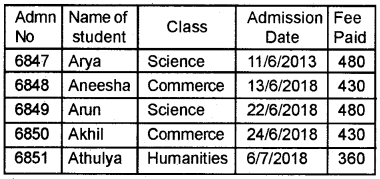
procedure:
Step 1 – Open Libre Office Base
Application → Office → LibreOffice Base.
Step 2 – Create a new database
Database wizard → Create a New Database → Next → Yes register the database for me → Open the database for editing Finish.
Step 3 – In Save Dialogue box, give the name STUDENTFEE and select a location to save the database and click Save button.
The new database file STUDENTFEE.odb. is created
Step 4 – Create Data Tables
From the left Database Pane, click on the icon Tables and below the Tasks section, click on ‘Create Table in Design view’
Database Pane → Tables → Create Table in Design view
Step 5 – Field Name Entry
In Table creation Screen, Enter the Field names and select appropriate Data Types as given below.
| Field Name | Data Type |
| Admn No. | Number (Numeric) |
| Name of student | Text (VARCHAR) |
| Class | Text (VARCHAR) |
| Admission date | Date(DATE) |
| Fee Paid | Number (Numeric) |
Step 6 – Setting Primary Key
To set the Admn No. as the Primary key, Right click on the row selector of Admn No. and select the Primary key from the drop down menu
Step 7 – Save Table
Click on Save button (or press Ctrl+S) to save the table. In save as dialogue box, Enter Tblstuderrts as table name and click on OK button Close the table creation screen
Step 8 – Data Entry
Database Pane → Tables → Created Tables → Select Tbl students → Double click to open it
Enter all the data given one by one
Output:
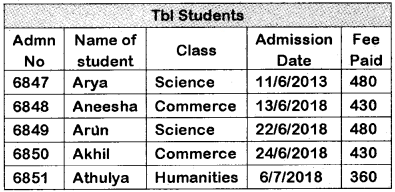
Question 2.
Create Two Data Tables named TBLSTUDENT and TBLMARKS in LibreOffice Base with the following fields and show the relationship assuming that the first fields in both tables are set as primary keys
Table – 1
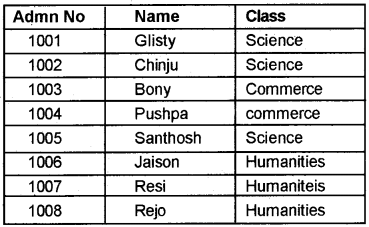
Table – 2
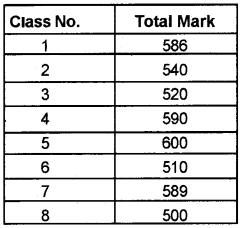
procedure:
Step 1 – Open LibreOffice Base
Application → Office LibreOffice Base
Step 2 – Create new Database
Datebase wizard → Create a new database Next → Yes, register database for me → Open the data base for editing → click on Finish button
Step 3 – In save Dialogue box, give the name STUDENTFILE and select a location to save the database and click Save button.
The new database file STUDETFILE.odb is created
Step 4 – Create Data Tables
Create Table – 1
From the left Data base pane, click on the Icon Tables and below the Tasks section, click on ‘Create Table in Design view’,
Data base Pane → Tables → Create Table in Design view
Step 5 – Field name Entry:
In Table creation screen, Enter the field names and select appropriate Data Types as given below
| Field Name | Data Type |
| Admn No. | Number (Numeric) |
| Name | Text (VARCHAR) |
| Class | Text(VARCHAR) |
Step 6 – Setting Primary key
To set Admn No as the primary key Right click → Primary key from the drop-down menu
Step 7 – Save Table
Press Ctrl+S on click on save button to save the table. Enter the name TBLSTUDENT → Click OK button.
Step 8 – Repeat the same steps for creating the second Table
Create Table -2
| Field name | Data Type |
| Class No. | Number (Numeric) |
| Mark | Number (Numeric) |
Set ‘Class No’ as the ‘Primary key’ save the table by naming TBLMARKS. Then close the table creation screen.
Step 9 – Data Entry
Data base Pane → Tables → Created Tables → Select → (Two tables TBLSTUDENT and TBLMARKS one by one) → Double click to open it
Enter all the details one by one.
Step 10 – Create Relationship
(a) Go to the Tools menu, select Relationships. Now Add Table dialogue box will appear. Add both the tables to the relationship window and close the Add Table dialogue box
(b) Create relationship between TBLSTUDENT and TBLMARK. Position the mouse pointer over the primary key of TBLSTUDENT table, hold down the left mouse button, drag the pointer right to the primary key in the TBLMARK table and then release the mouse button.
(c) Click on Save button in relation design window to save the relationship File → Save Click Close button to close the relation design window
Output:
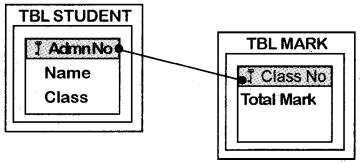
Question 3.
Create a Form in LibreOffice Base to Manage data in a table named customers with the following details.
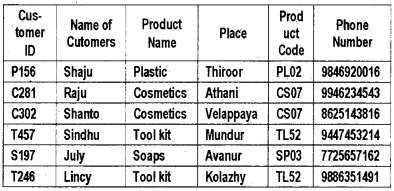
Step 1 – Open LibreOffice base
Application → Office LibreOffice Base
Step 2 – Create New Database
Database wizard → Create a new database Next → Yes, register database for me Open the database for edting → Click on Finish button
Step 3 – In save dialogue box, give the name CUSTOMERFILE . Select the location to save the database and cfick Save button.
The new database file CUSTOMERFILE.odb is created.
Step 4 – Create Data Tables
From the left database pane, click on the Icon Tables, and below the Tasks section, click on ‘Create Table in Design View’
Database Pane → Tables Create Tables in Design View
Step 5 – Enter necessary field names and select appropriate Data Type. Save the Table in the name TBLCUSTOMER and close the window
Step 6 – Create Form
From the left database pane, click on the Forms button and in right side, under Tasks section, click on Use Wizard to Create a Form.
Now Form wizard window opens
Data base Pane → Forms → Use wizard to create a Form
Step 7 – Selection of fields
- In Form wizard, select TBLCUSTOMER from the combo box under the head Tables/Queries. → Click on Next button.
- Add all Fields to Fields in the Form section in the right side by clicking >> button → Next button
- Setup subform → Next → Arrange controls → Next
- Set Data entry → Select The form is to display all data → Next → Apply styles → Next
- Enter the name of the form inset Name Option as FORM CUSTOMER → select work with the Form → Finish
Now the data entry form will be opened
Step 8 – Data Entry in the form
Enter data in each field and Press Enter Key or Tab Key
Output:
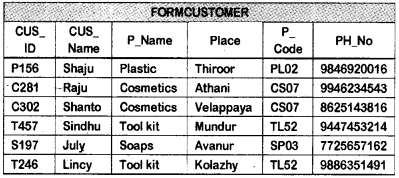
Question 4.
Enter the following data in a database table
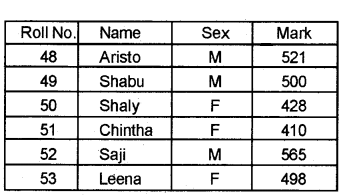
- Display the names of students who scored greater than or equal to 500.
- Display the name of student whose name begin with ‘S’
Procedure:
Step 1 – Open LibreOffice Base
Application → Office → LibreOffice Base
Step 2 – Create New Database
Datebase wizard → Create New Data base Next Yes, register the database form → Open the database for editing → Finish
Step 3 – In Save dialogue box, give the name STUDENTMARK and select the location to Save the data base and click Save button, the new data base file STUDENTMARK.odb. is created.
Step 4 – Create Data Table
From the left Database Pane, Click on the icon Tables, and below the Tasks section, Click on ‘Create Table in Design view’
Database Pane → Tables → Create Tables in Design view
Step 5 – Filed Name Entry
In Table creation Screen, Enter the Field names and select appropriate Data Types as given below
Step 6 – Setting Primary Key
To set STUDROLL_NO as primary key Right click → Select Primary key from the drop down menu
Step 7 – Save Table
Click on Save button or Press Ctrl+S to save the table. In save as dialogue box, Enter TBLSTUDENTDETAILS as the name and dick on OK Button
Close the Table creation screen.
Step 8 – Data Entry
Data base pane → Tables → Created Tables → Select TBLSTUDENTDETAILS → Double click to open it Enter all the data on by one
Step 9 – Create Query
- From the Data base Pane, Click on Queries button and in the right side under Task section, Click on Create Query in Design view. Now Add Table or Query Window opens.
- Select the table TBLSTUDENTDETAILS and click Add button, then close the window.
- In the Query Design window, double click on each Field in Table window to add all the fields to query design grid.
Step 10 – Enter Query Criteria (Question 1)
In Query design Grid, set the Criteria for the query.
- Enter >=500, in the Criterion row in STUDMARK column.
- Click on the RUN Query Button or Press F5 to display the result.
- Save and close the query. File → Save. ‘Save as’ window opens. Give the name Query 1 and click on OK button.
Step 11 – Enter the Query Criteria (Question 2)
In the Query design grid, set the criteria for the query
a) Enter LIKE ‘S*’, in the criterion row in STUDNAME column.
b) Click on the Run Query Button or Press F5 to display the result.
c) Save and close the query.
File → Save. ‘Save as’ window opens. Give the name ‘Query 2’ and click on OK button.
Output – 1
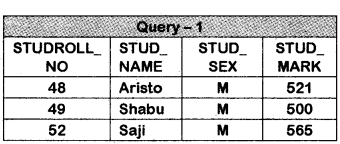
Output – 2
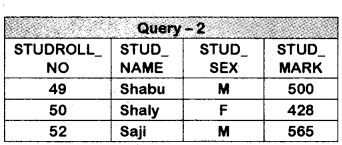
Question 5.
Enter the following list of employees in Tblemployee and make a report from this table sorted in the order of Designation.
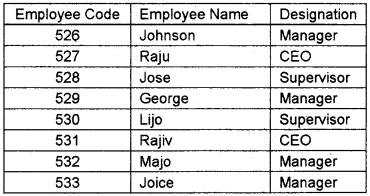
Procedure:
Step 1 – Open Libre Office base
Step 2 – Create new database
Database wizard → Create a new database → Next → Yes, register database for me → Open the database for editing → Click on Finish Button.
Step 3 – In save dialogue box, give the name Employee file. Select the location to save the database and click Save button.
Now, the new database file Employeefile.odb is created.
Step 4 – Create data tables
From the left database pane, click on the icon Tables, and below the Tasks section, Click on Create Table in Design View. Database Pane → Tables → Create Tables in design view.
Step 5 – Enter the necessary field names and select appropriate Data Type. Save the Table in the name Tbl employee and close the window.
Step 6 – Create Report
In the left Pane of the data base window, click on the Reports button and in right side, Under Tasks section click on Use Wizard to create a Report. This will open a Report wizard.
Step 7 – In Field selection step, under Tables Queries, Select the table Tblemployee. Then Press Add All buttons [>>] to all fields to report. Then click Next button.
Step 8 – Labelling fields (Skip this Step) → Next → Grouping Level (Skip this Step) → Next → In sort Option, Select Designation against sort by, and click Next button.
Step 9 – Choose Layout section, Select Tabular in the layout. → Click Next → In create Report Section → Give the tittle of Report as Report-Designation and select modify I Report Layout → Click Finish button.
Step 10 – Report Design window, click on Page Header area → Insert → Report controls → Label field to insert a Header for the report
Step 11 – Double click on the Label Field inserted and in the property window edit the Label as “Designation List of Employees” and Press Enter.
Step 12 – Click on Execute Report button to view the Report.
